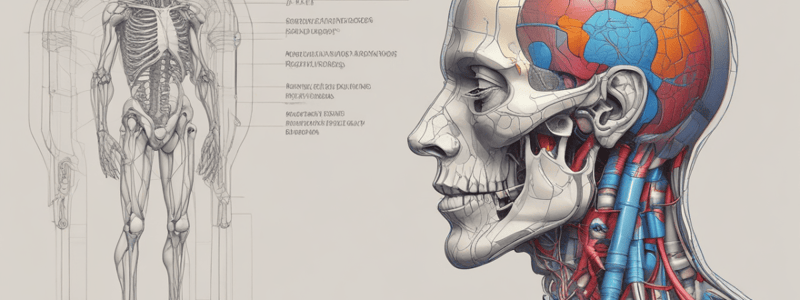Podcast
Questions and Answers
What is the function of the peripheral nervous system (PNS)?
What is the function of the peripheral nervous system (PNS)?
- To study the functions or activities performed by body structures
- To supply blood to the side and crown of the head
- To perform specific functions using specialized tissues
- To carry impulses or messages to and from the CNS (correct)
Which muscle is a flat band around the upper and lower lips?
Which muscle is a flat band around the upper and lower lips?
- Platysma
- Orbicularis Oris (correct)
- Pectoralis Major
- Pectoralis Minor
What does the term 'os' mean?
What does the term 'os' mean?
- Muscle
- Bone (correct)
- Nerve
- Blood
What does osteology study?
What does osteology study?
Which artery supplies blood to the side and crown of the head?
Which artery supplies blood to the side and crown of the head?
Where are the parietal bones located?
Where are the parietal bones located?
Which muscles assist in the swinging movements of the arm?
Which muscles assist in the swinging movements of the arm?
What is the more fixed part of a muscle that does not move called?
What is the more fixed part of a muscle that does not move called?
The broad muscle extending from the chest and shoulder muscles to the side of the chin is responsible for which action? Platysms
The broad muscle extending from the chest and shoulder muscles to the side of the chin is responsible for which action? Platysms
What are phalanges?
What are phalanges?
What is the definition of organs in the human body?
What is the definition of organs in the human body?
What is the study of the functions or activities performed by the body’s structures?
What is the study of the functions or activities performed by the body’s structures?
Which of the following is an example of a physiological function?
Which of the following is an example of a physiological function?
What is the relationship between organs and physiology?
What is the relationship between organs and physiology?
Why is it important to study organs and physiology?
Why is it important to study organs and physiology?
Flashcards are hidden until you start studying
Study Notes
Muscles
- Orbicularis oris muscle: a flat band around the upper and lower lips
- Pectoralis major: muscles of the chest that assist the swinging movements of the arm
- Platysma: a broad muscle extending from the chest and shoulder muscles to the side of the chin, responsible for depressing the lower jaw and lip
Bones and Osteology
- Os: means "bone" and is used as a prefix in many medical terms
- Osteology: the study of the anatomy, structure, and function of the bones
- Parietal bones: bones that form the sides and top of the cranium
- Phalanges: bones of the fingers or toes
Nervous System
- Peripheral nervous system (PNS): made up of sensory and motor nerve fibers that extend from the brain and spinal cord to all parts of the body, carrying impulses or messages to and from the CNS
Anatomy Terms
- Origin: the more fixed part of a muscle that does not move
- Organs: structures composed of specialized tissues performing specific functions
Physiology
- Physiology: the study of the functions or activities performed by the body's structures
Muscles
- Orbicularis Oris Muscle: a flat band around the upper and lower lips
- Pectoralis Major: muscles of the chest that assist the swinging movements of the arm
- Pectoralis Minor: (no definition provided)
- Platysma: a broad muscle extending from the chest and shoulder muscles to the side of the chin that is responsible for depressing the lower jaw and lip
Bones
- Parietal Bones: bones that form the sides and top of the cranium
- Phalanges: bones of the fingers or toes
Anatomy
- Os: means "bone"; it is used as a prefix in many medical terms
- Osteology: the study of the anatomy, structure, and function of the bones
Nervous System
- Peripheral Nervous System (PNS): made up of sensory and motor nerve fibers that extend from the brain and spinal cord to all parts of the body, carrying impulses or messages to and from the CNS
General Terms
- Organs: structures composed of specialized tissues performing specific functions
- Origin: the more fixed part of a muscle that does not move
- Physiology: the study of the functions or activities performed by the body's structures
- Parietal Artery: an artery that supplies blood to the side and crown of the head
Studying That Suits You
Use AI to generate personalized quizzes and flashcards to suit your learning preferences.



